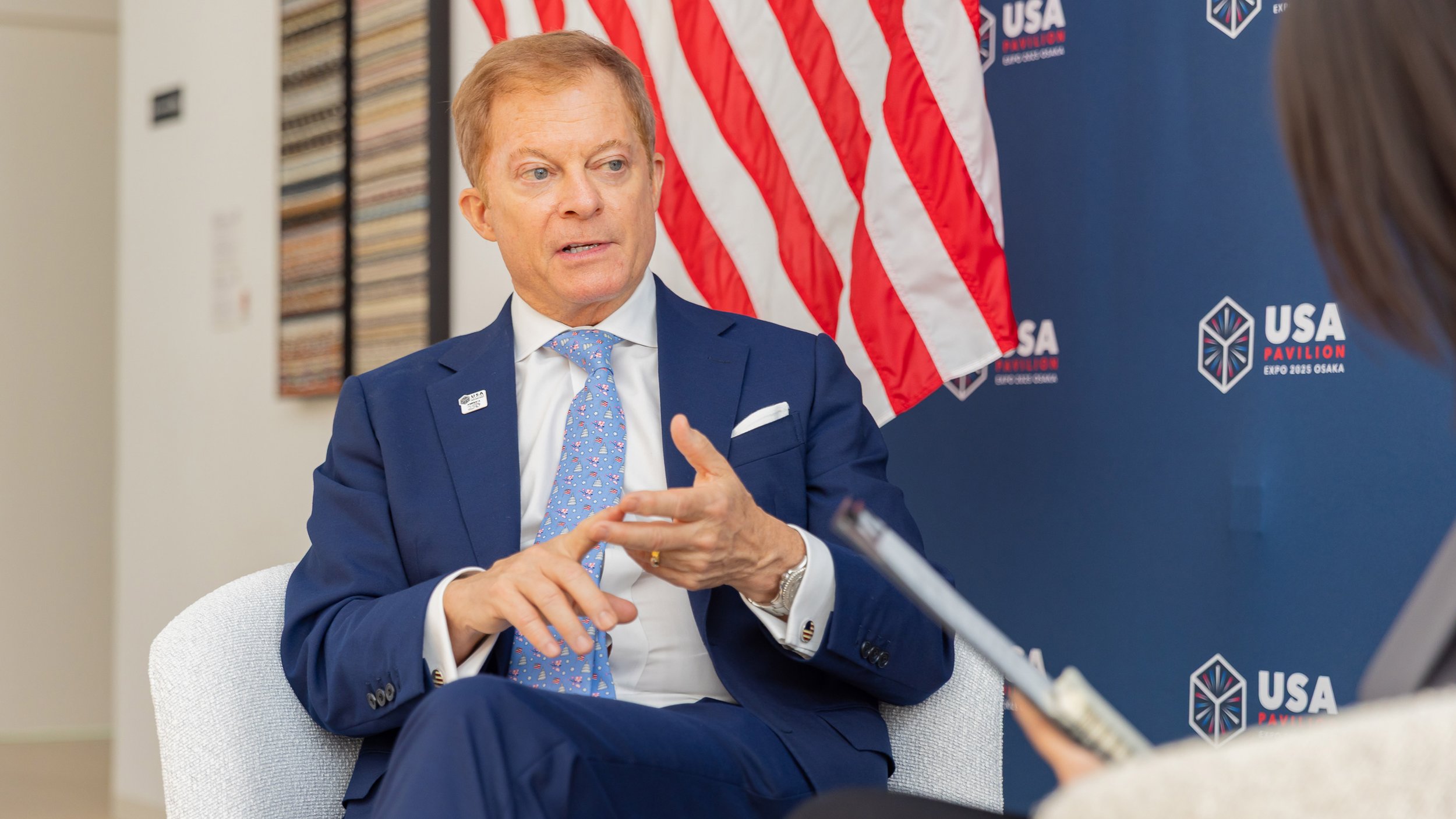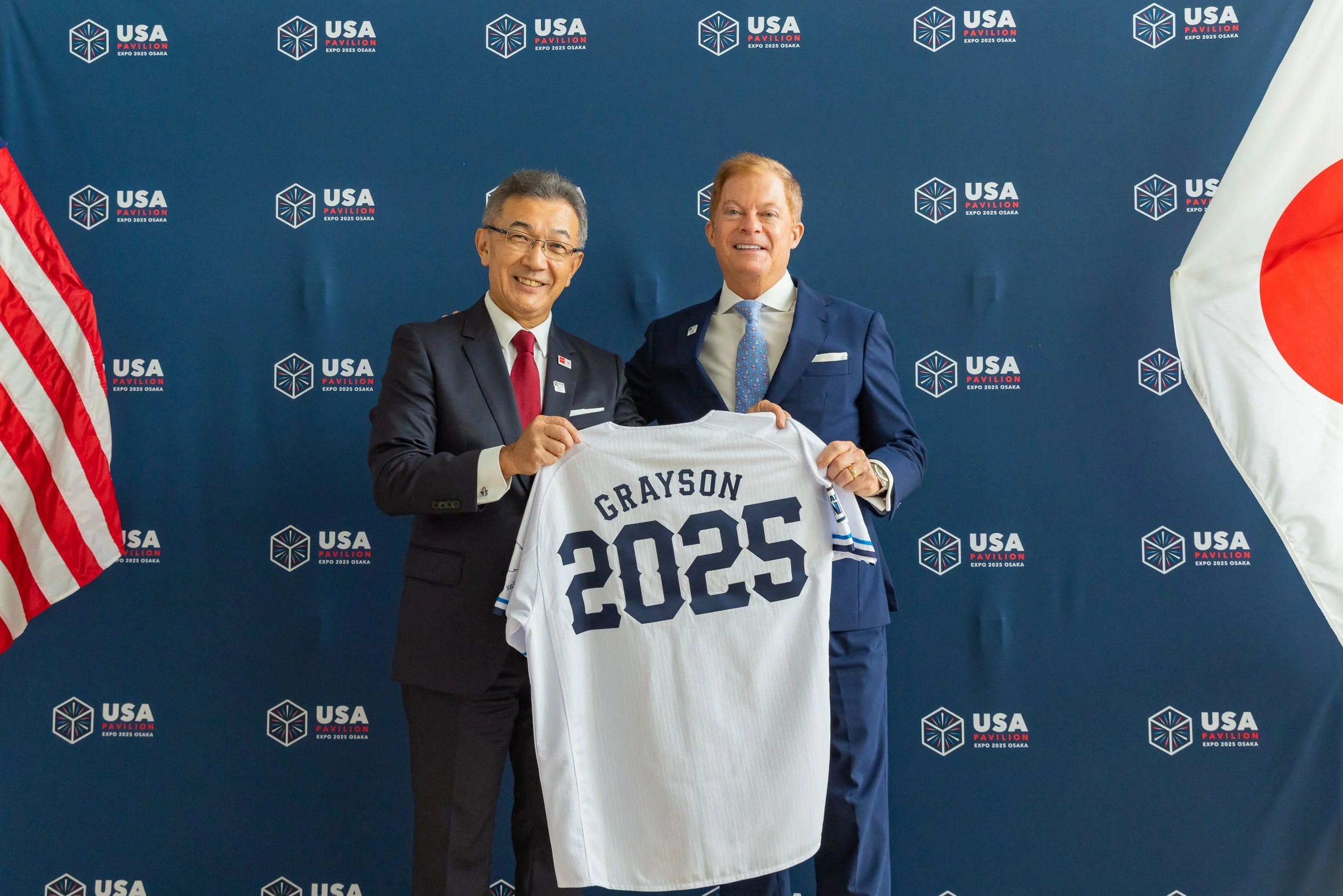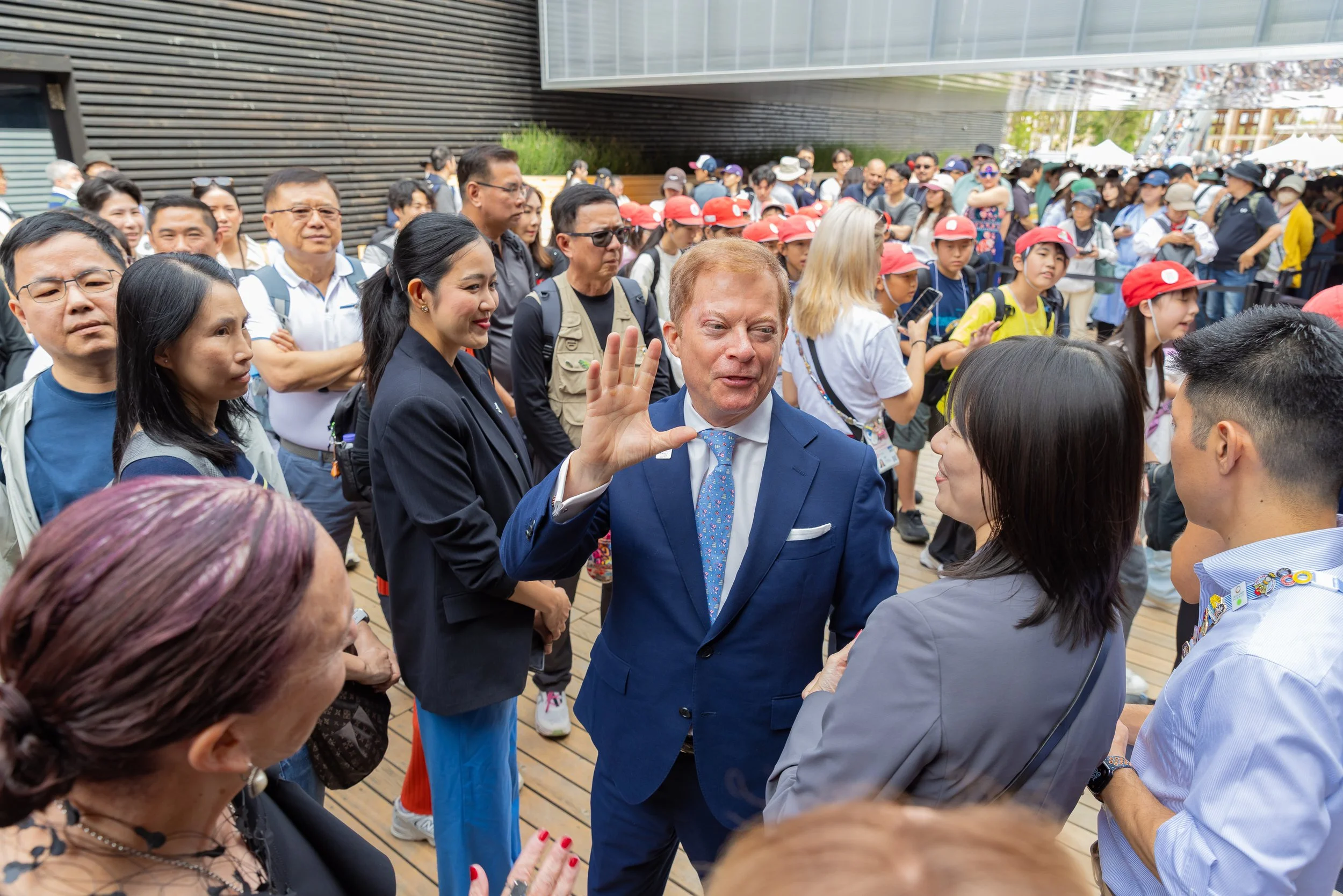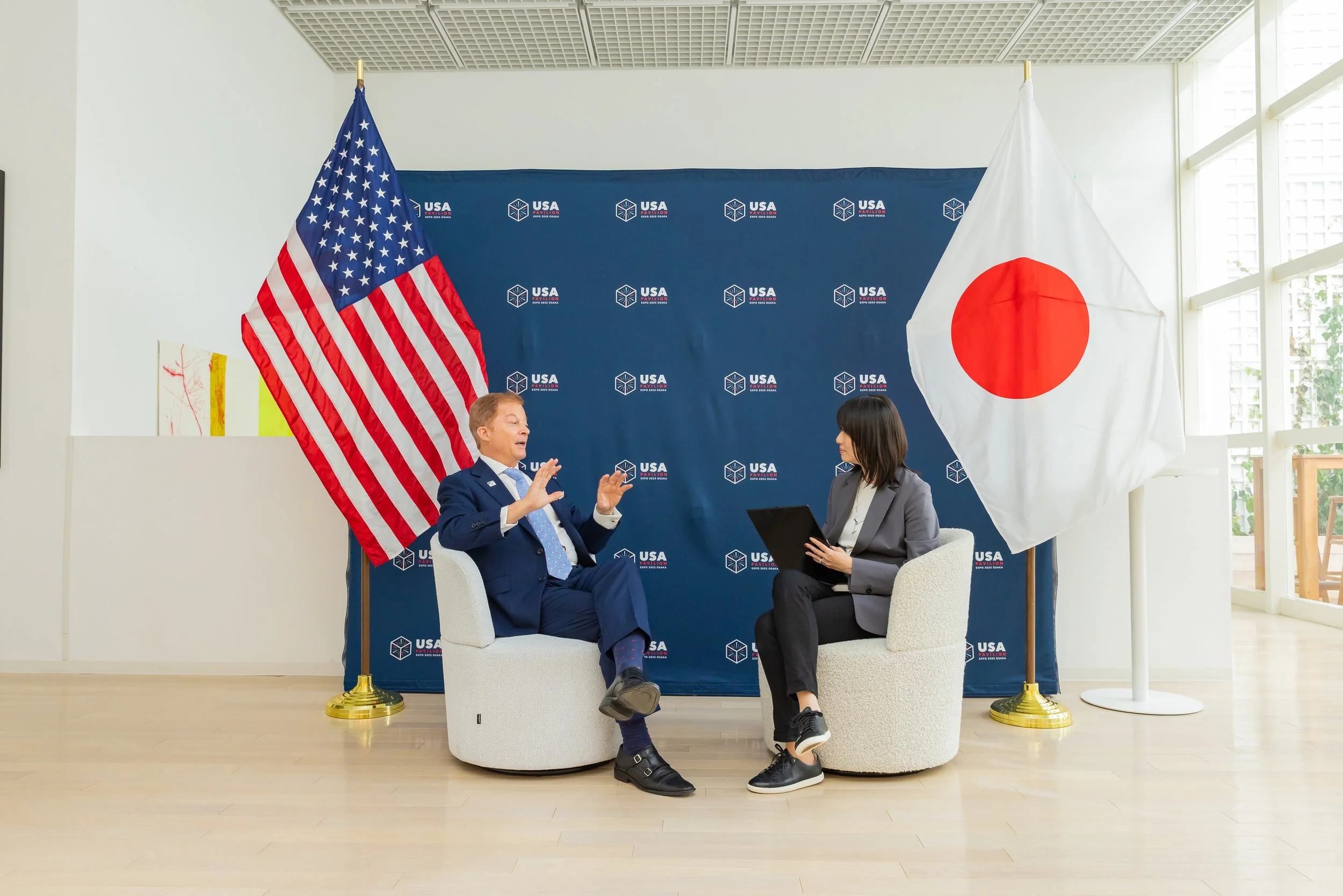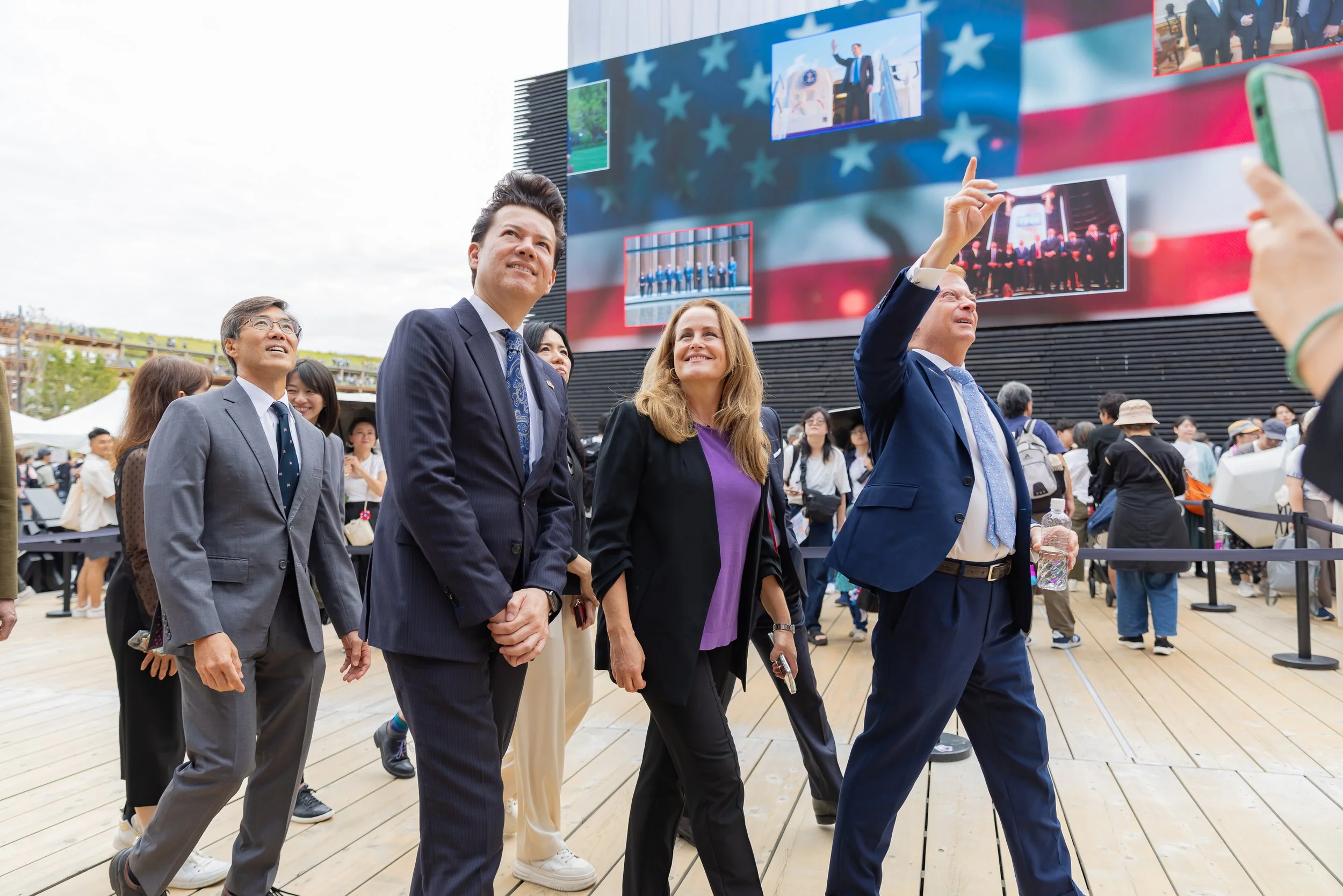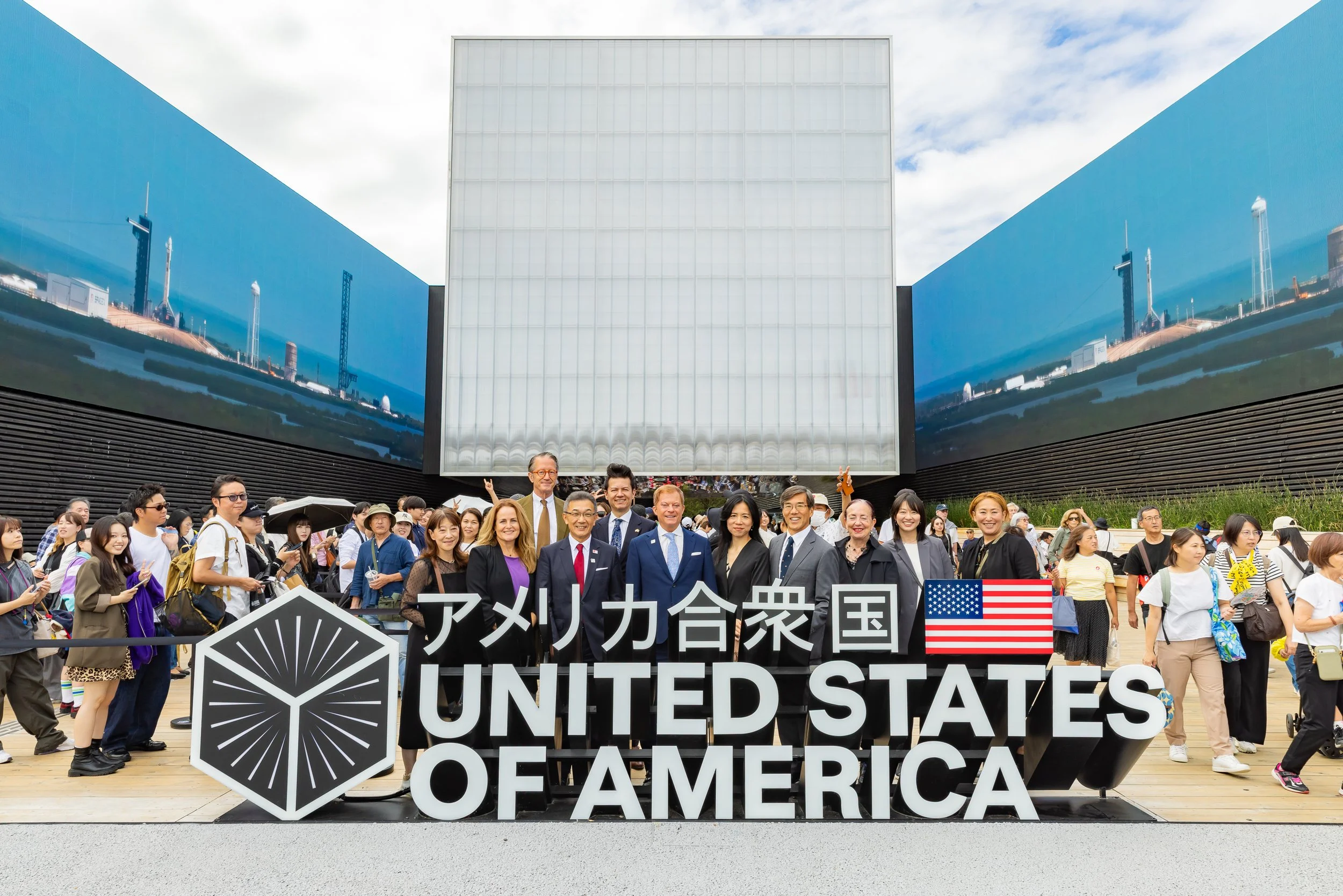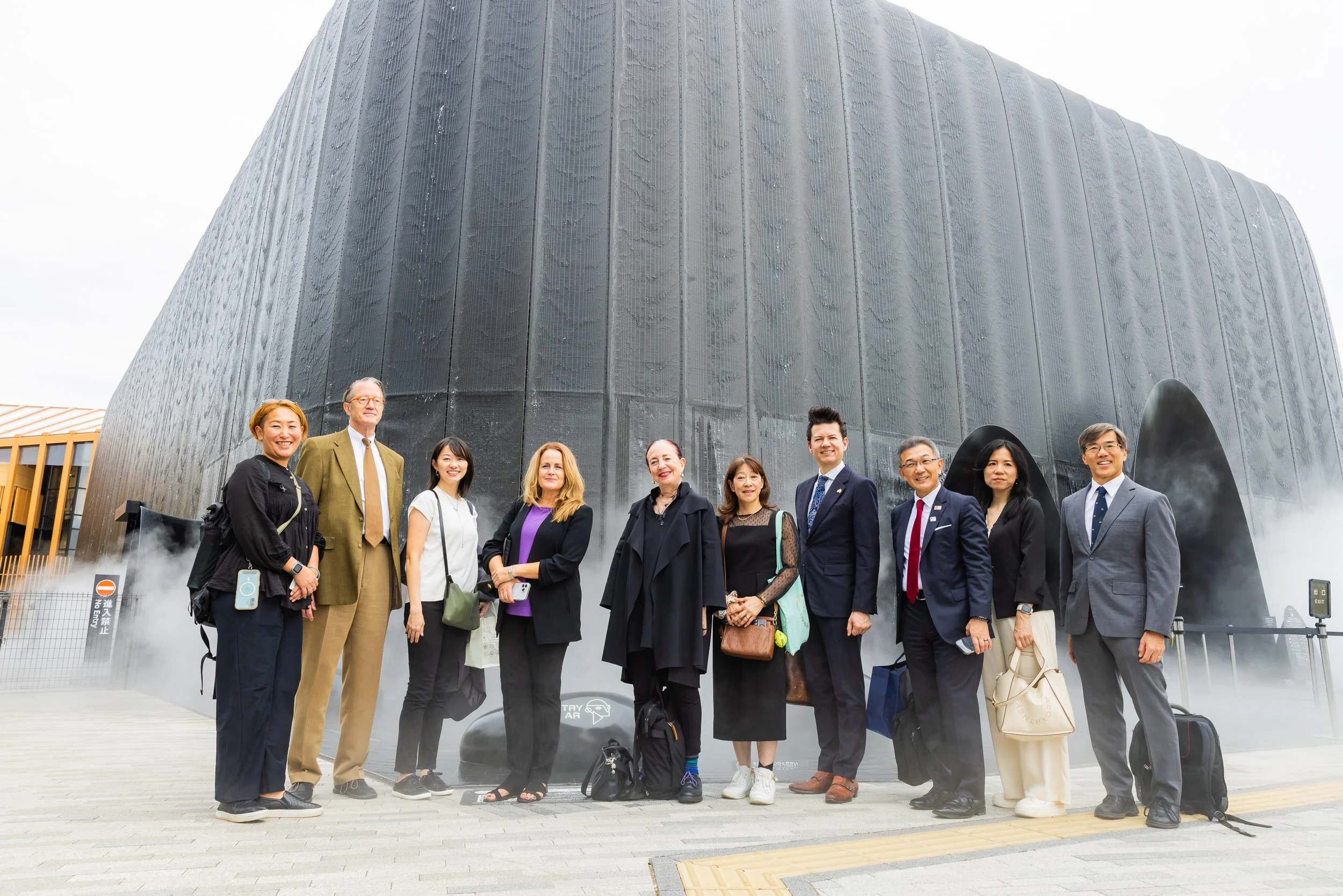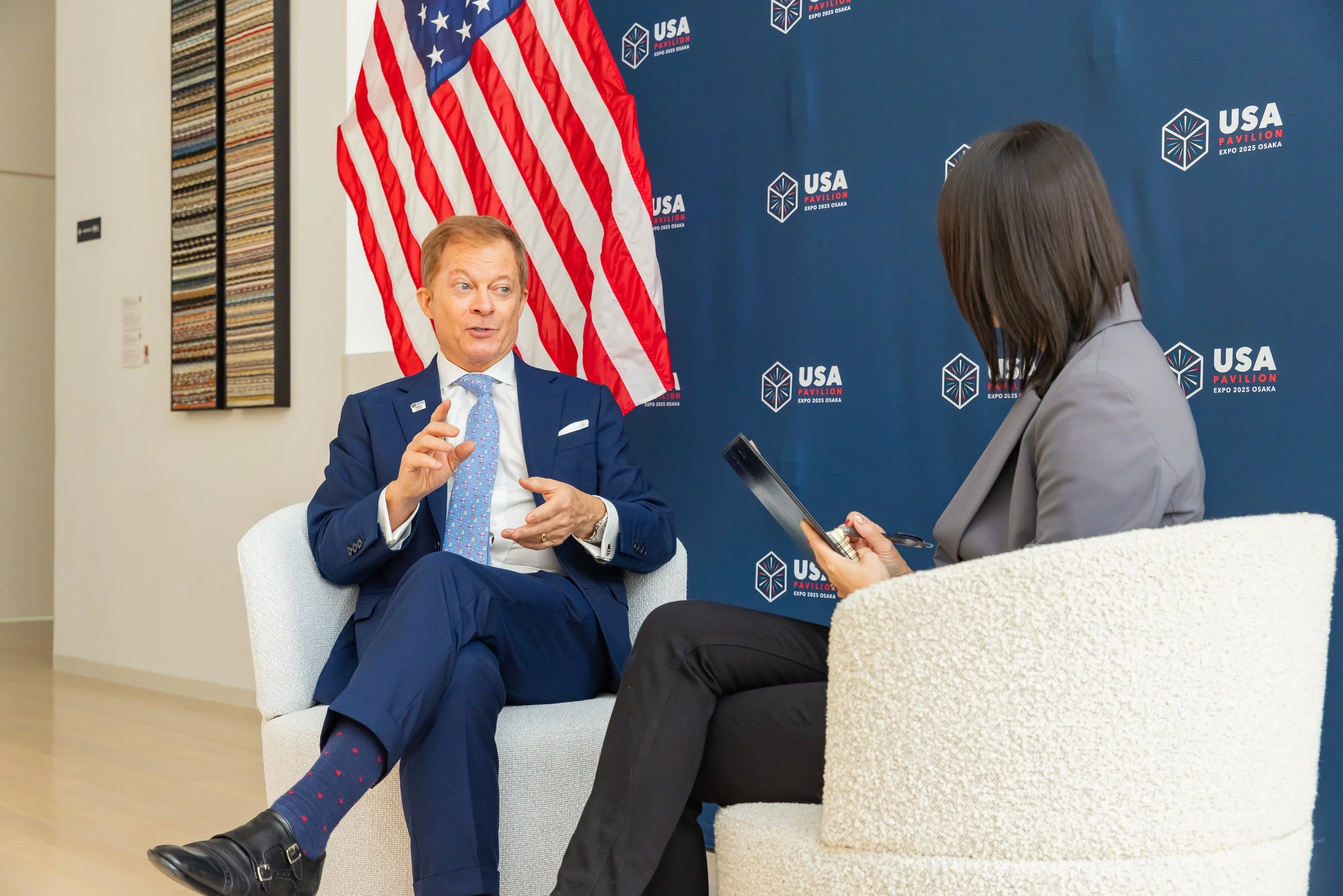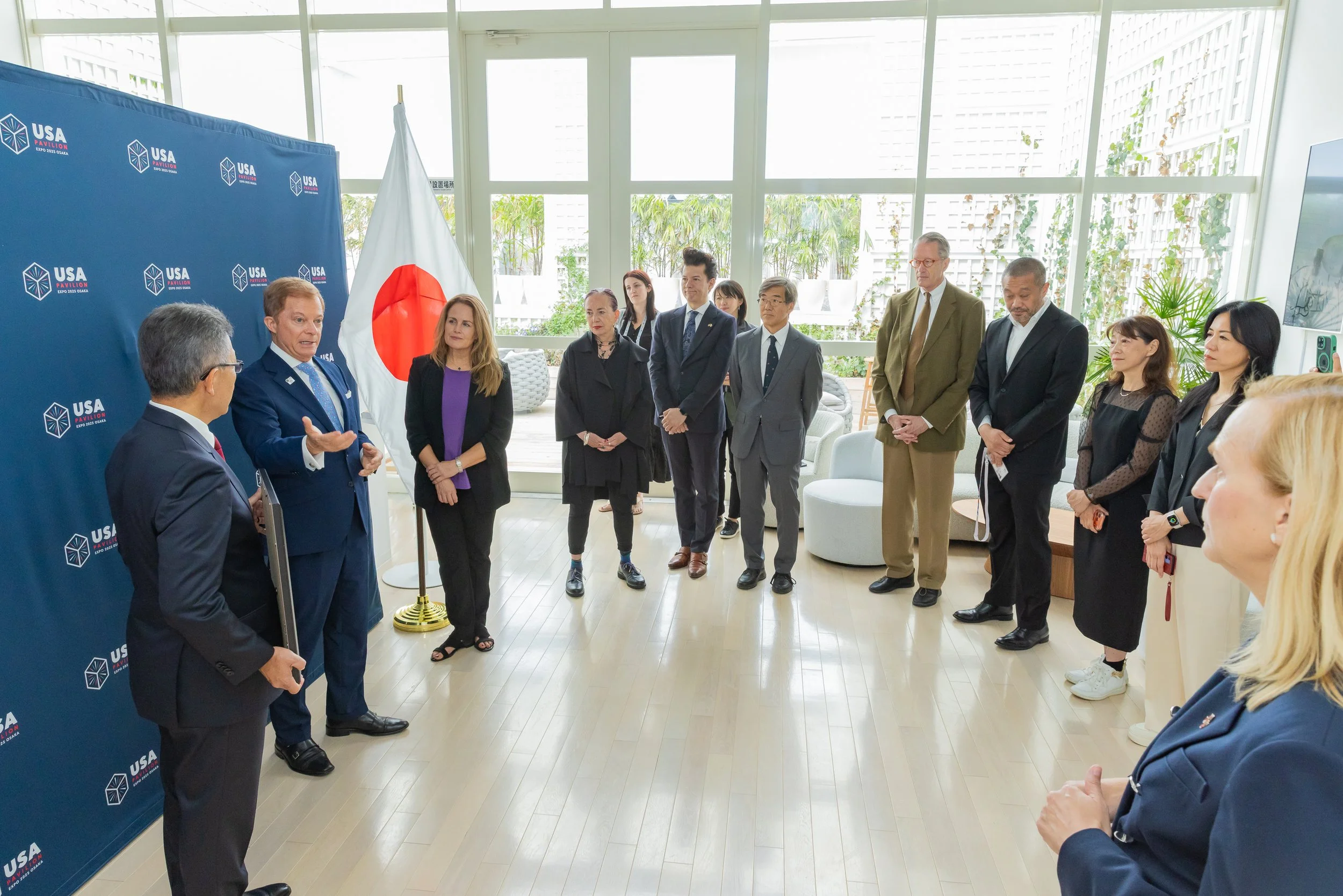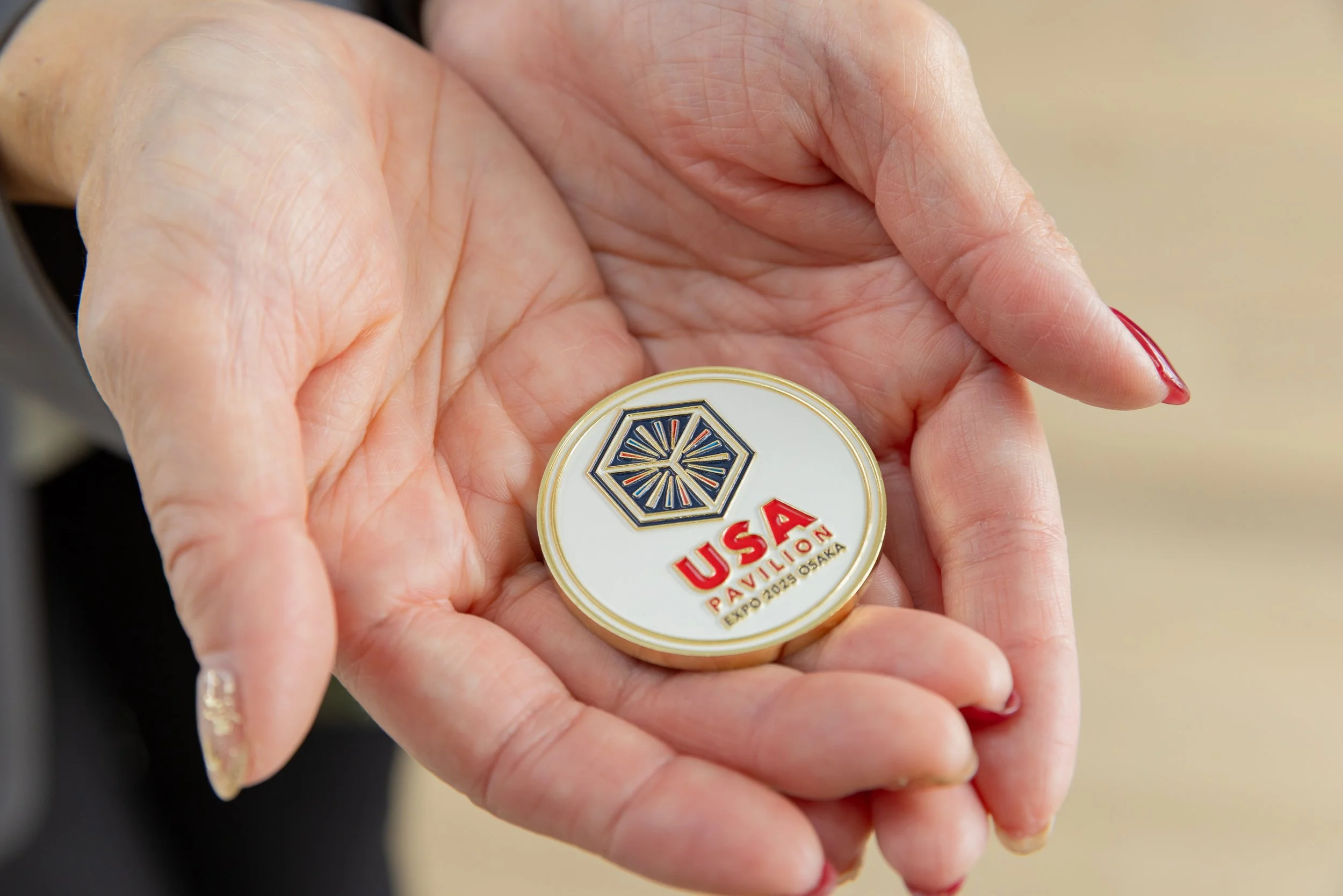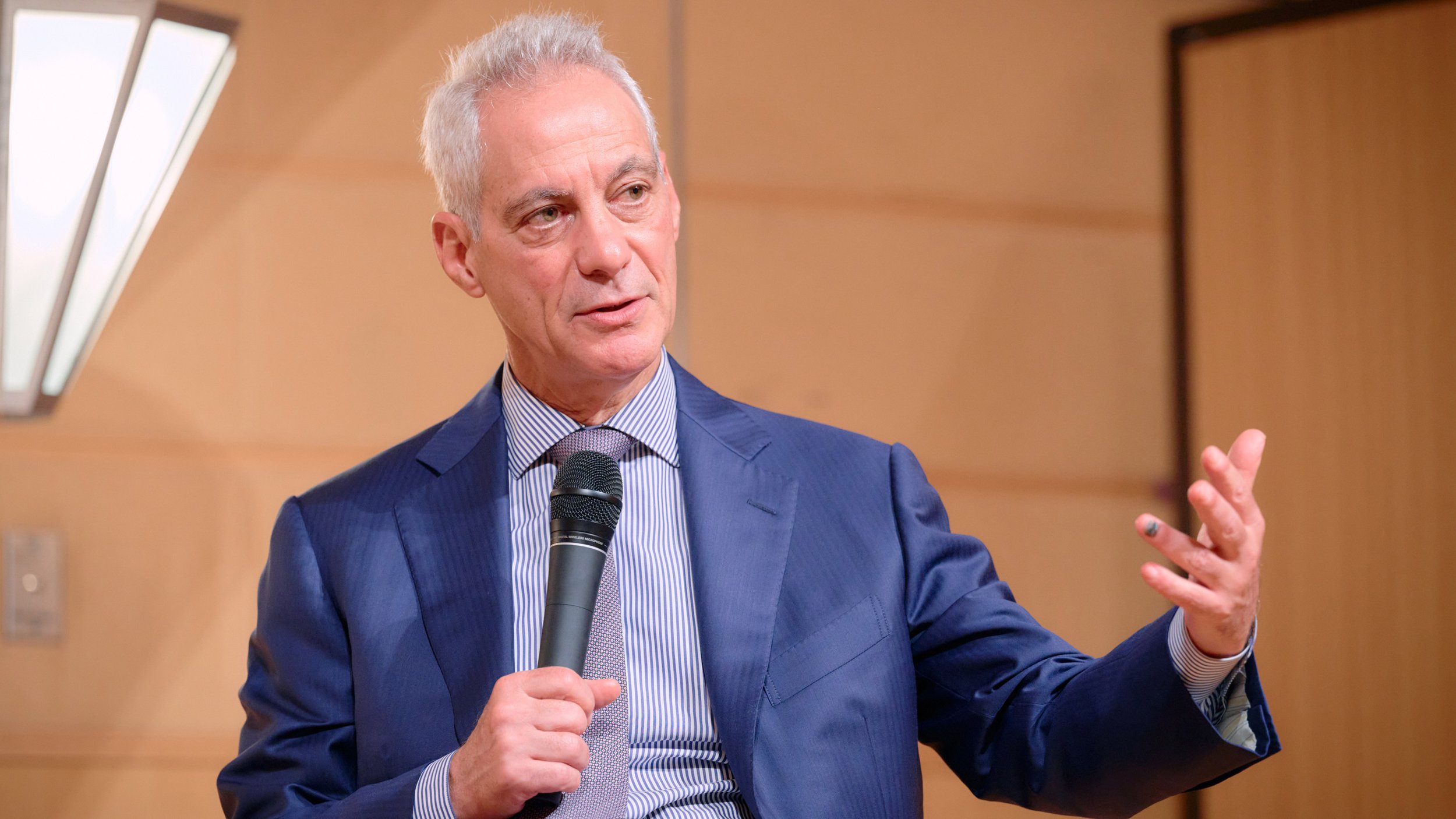2025 Person of the Year: Ambassador William E. Grayson
On October 10, the American Chamber of Commerce in Japan (ACCJ) recognized Ambassador William E. Grayson as the 2025 ACCJ Person of the Year. He was selected for his leadership in advancing the US–Japan partnership as commissioner general of the USA Pavilion at Expo 2025 Osaka, Kansai.
The ACCJ honors the USA Pavilion commissioner general for his support of Expo 2025 and bilateral relations.
Interview by Masami Ito • Photos by Yuichi Terada/Cloud9Field
On October 10, the American Chamber of Commerce in Japan (ACCJ) recognized Ambassador William E. Grayson as the 2025 ACCJ Person of the Year. He was selected for his leadership in advancing the US–Japan partnership as commissioner general of the USA Pavilion at Expo 2025 Osaka, Kansai.
ACCJ President Victor Osumi and Executive Director Laura Younger were joined by Vice Presidents Sarah Bader and Jiro Kawakami as well as Governors Julian Bashore, Yumiko Ohta, Frank Packard, Megumi Takayama, and Simone Thomsen plus Treasurer John Kawase to present the award at the USA Pavilion just before the official close of the expo, which ended its six-month run on October 13.
Reaching that finish line, Grayson told The ACCJ Journal, gave him and his team a chance to look back at everything they had accomplished. “I think we’ve all been so deep into it—15 hours, 16 hours every single day—without thinking often about the broader impact.”
That wider influence can certainly be seen in the many interactions between the United States and Japan through the USA Pavilion and the extensive exposure the expo gave US business, innovation, and culture.
Imagine the Infinite
Grayson oversaw the pavilion’s theme—Imagine What We Can Create Together—which focused on innovation, exploration, and the future of human potential. This included:
- Space exploration
- NASA’s Artemis moon program
- US–Japan scientific collaboration
- Next-generation technologies
- Human ingenuity in engineering, medicine, and sustainability
The ACCJ contributed to this with its Osaka to Orbit event, held in the USA Pavilion on August 19. The panel discussion, which highlighted Japan’s contributions to advancing the space industry, featured Osamu Aoki, president and chief executive officer of Aoki Co., Ltd.; Nobu Okada, founder and chief executive officer of Astroscale Holdings; Koichi Yonemoto, cofounder and chief technology officer of Space Walker Inc.; and Dr. Koichi Wakata, chief technology officer at Axiom Space and Japan’s most experienced astronaut.
One item on display at the USA Pavilion was a moon rock brought back to Earth by the astronauts of Apollo 17. Grayson mentioned how former Japanese Prime Minister Shigeru Ishiba remembers seeing another moon rock retrieved by Apollo 12 astronauts at the 1970 Osaka expo, and also that astronauts visiting this year’s exhibition shared that the same experience led to their love of space and desire to take to the stars. “Grandparents bringing their grandkids through to see what they saw back in 1970, it has a very powerful impact, a lasting effect,” the ambassador said.
Shifting Gears
The USA Pavilion welcomed nearly 2 million visitors, and more than 29 million explored the exhibits of 160 nations. The final count made Expo 2025 Osaka, Kansai the second-highest-attended world expo in the past 25 years, trailing only Shanghai in 2010.
But such a resounding success was far from certain before the gates opened.
“The press was terrible,” recalls Grayson of the situation he found when he arrived. “The expo was going to fail, they said. These buildings were going to sink into Yumeshima Island. Nobody was going to show up. The thought among the government and even the expo leaders was that this thing is going to fail.”
Public excitement was also low. A nationwide survey conducted by the Mainichi Shimbun just six weeks before the grand opening found that two-thirds of respondents had no plans to attend the expo.
Grayson, appointed commissioner general in April, was determined to change the narrative. Bringing his strong background in business, finance, law, and public policy to the task of serving as the senior US government representative to the Government of Japan for the expo, he played an important role in guiding the USA Pavilion to success as one of the expo’s most popular destinations, delivering fascinating exhibits that piqued interest among those unsure about visiting.
Strengthening Relations
Beyond that, noted Osumi at the award presentation, he and his team strengthened the long-standing legacy of collaboration and deepened ties between the United States and Japan.
His role as commissioner general included hosting a presidential delegation from Washington on July 19 that included Treasury Secretary Scott Bessent and US Ambassador to Japan George Glass. Three days later, it was announced that the United States and Japan had reached a new bilateral trade agreement. Seeing the expansive opportunities and warm relations during this visit, Grayson suggested, may have helped push things over the finish line.
If the visit did play a role, it’s the sort of impact Grayson sees as a strength of the world expo concept. “A lot of it is just convening great people who come together at every possible level,” he explained. “We really provide the genesis and the spark of opportunity for people to make things happen. Culturally, business-wise, diplomatically, on every level. And there’s no place in the world where you can bring 160 nations together this closely, with this much interaction, and not have great things come from it.”
Grayson thanks his whole team, including Tom Hwei, the deputy commissioner general who arrived in Osaka before him, for their hard work month after month and without breaks. “We’ve been through something together that is so significant, so important, showcasing the United States of America in the best possible light on the grandest diplomatic stage in the world.”
An Honor to Serve
Accepting the ACCJ Person of the Year award as the expo ended, Grayson was to return to San Francisco and his wealth management planning practice. But he looked back fondly on the previous 184 days that had flown by at warp speed, saying he expected to spend a lot more time in Japan in the future.
“It’s bittersweet because all of us have loved it, and it’s sad because it’s coming to an end,” he said. “I think [the expo has] done a remarkable job of further strengthening relations. We saw a very strong bond between Japan and the United States, but I think it’s exceeded all expectations in terms of how good it would be. We’ve had so many representatives from the US government, Congress, various departments and agencies, and businesses come here from the US to help support it, because they were excited to see it. So I think it’s been, as I like to say, an Ohtani grand slam for both countries.”
2025 Person of the Year: Ambassador William E. Grayson
The ACCJ honors the USA Pavilion commissioner general for his support of Expo 2025 and bilateral relations.
The ACCJ honors the USA Pavilion commissioner general for his support of Expo 2025 and bilateral relations.
Photos Yuichi Terada/Cloud9Field
On October 10, the American Chamber of Commerce in Japan (ACCJ) recognized Ambassador William E. Grayson as the 2025 ACCJ Person of the Year. He was selected for his leadership in advancing the US–Japan partnership as commissioner general of the USA Pavilion at the Expo 2025 Osaka, Kansai.
ACCJ President Victor Osumi, Executive Director Laura Younger, and several ACCJ Board members presented the award at the USA Pavilion, just before the Expo officially closed on October 13.
The expo, which highlighted nearly 160 countries and regions, was a resounding success for Japan and the Kansai region, drawing 25,578,986 visitors during its 184-day run. In the final month, an average of 200,000 guests per day explored the global gathering on the artificial island of Yumeshima in Osaka Bay.
At the award presentation, Osumi highlighted how Grayson, alongside the entire USA Pavilion team, strengthened the long-standing legacy of collaboration and deepened ties between the United States and Japan. Guided by the theme Imagine What We Can Create Together, the USA Pavilion welcomed more than one million visitors to experience the breadth of US innovation and entrepreneurship, from space exploration to artificial intelligence and next-generation technologies.
The ACCJ was also proud to hold the “Osaka to Orbit: Showcasing Space Ambitions from Japan” event at the USA Pavilion, highlighting bilateral innovation and collaboration on space exploration.
An in-depth interview with Grayson will be published in the upcoming issue of The ACCJ Journal.
About the ACCJ Person of the Year
Created in 1996, the award recognizes individuals who have had a significant positive impact on the international business environment in Japan and advanced relations between Japan and the United States. Past recipients include Rahm Emanuel (2024), Caroline Kennedy (2016), Wendy Cutler (2015), Hiroshi Mikitani (2011), Taizo Nishimuro (2005), Yoshihiko Miyauchi (2001), and Walter Mondale, the first recipient.
Alliance Maker
As US Ambassador to Japan Rahm Emanuel prepares to hand over the reins to a new envoy, he talks to The ACCJ Journal about the experience, the importance of the alliance, and the future.
ACCJ Person of the Year Rahm Emanuel reflects on three years as the US ambassador to Japan
After being tapped by US President Joe Biden to serve as the nation’s ambassador to Japan, Rahm Emanuel arrived in Tokyo in January 2022 at a pivotal moment for the world. The Covid-19 pandemic was raging, Japan’s border closures were wreaking havoc on the business community, and the ripple effects were exposing vulnerabilities across the region.
Strengthening the bilateral relationship was essential. During his time as chief of mission, Emanuel has tirelessly worked to build bonds that foster a prosperous future not only for the United States and Japan, but for the entire Indo–Pacific.
In recognition of his strong support, the American Chamber of Commerce in Japan named Emanuel its 2024 Person of the Year and honored him with a special event on October 23 at Tokyo American Club.
As he prepares to hand over the reins to a new envoy, the 31st US ambassador to Japan talks to The ACCJ Journal about the experience, the importance of the alliance, and the future.
How can the business community strengthen the US–Japan alliance?
The US–Japan alliance is far from limited to our far-reaching security cooperation and the alliance’s place at the heart of a new latticework of security partnerships across the Indo–Pacific. That, of course, is fundamental to our relationship and to our collective deterrence in the region, but the United States and Japan have made strides on every front over the past three years.
As the largest foreign direct investor in each other’s economies, our two nations are persistently pursuing opportunities to forge closer links in business and research. In the fast-evolving environment of emerging technologies, our tech firms and academic institutions have the opportunity to lead the way in the research and development of artificial intelligence (AI), quantum computing, semiconductors, and other cutting-edge scientific fields.
But just as important as technological advances are our measures to protect them. This means tightening our export controls to ensure that technologies such as advanced AI chips don’t end up in the hands of adversaries with malign intentions. Ultimately, this is about securing our intellectual property, our economies, and the jobs of tomorrow.
“As the largest foreign direct investor in each other’s economies, our two nations are persistently pursuing opportunities to forge closer links in business and research.”
Of course, we need to ensure we have the relevant education programs in place to train the workers who will be shaping these 21st-century technologies. The United States and Japan have made real progress in this area through partnerships between tech companies and universities. We now need to keep up the momentum by continuing to expand and enhance these talent pipelines.
Investment is the fuel of great business ideas and ambitious thinking. Since the United States has a flourishing venture capital ecosystem, there are boundless opportunities for cooperation in this area between US and Japanese companies. Japan has long been a source of innovation and invention. It’s just a matter of finding the funding to ensure those ideas can take flight.
One area with huge potential is Japan’s biotechnology sector. An increasing number of start-ups are drawing interest from investors here. With greater collaboration and support from US biotech enterprises, and investors with expertise in the sector, Japan can become a leading biotech hub, not just in Asia but globally.
How do talent hurdles and gaps in DEI and marriage equality impact the alliance’s economic strength?
Japan faces the dual challenges of a rapidly aging society and a declining birthrate, which means that the country doesn’t have a person or a talent to lose when it comes to winning the 21st century.
Every country, including the United States and Japan, has a long way to go in fully implementing the principles of diversity, equity, inclusion, and accessibility. But if we are to build well-functioning societies and thriving economies, we need to leverage all our assets. It’s about properly and fairly employing the people we have and embracing an ethos of lifelong learning, upskilling, and retraining.
How can we best collaborate on AI?
Looking at the speed at which AI is being developed and adopted, there is no time to lose in ensuring the United States, Japan, and our allies remain at the forefront of this technology. It is imperative that we set the pace in its continuing evolution and in establishing a fully functioning, well-regulated ecosystem that is aligned with our laws and interests. The sector is already seeing a lot of research and development cooperation and cross-border investment between the United States and Japan. Having talked to many major players in the field, I am confident that this trend will only grow.
During former Prime Minister [Fumio] Kishida’s state visit to Washington in April, we saw the launch of an initiative between US and Japanese universities and private sector partners in both countries to boost AI-focused research and workforce development.
The partnerships between Carnegie Mellon and Keio Universities, and between the Universities of Washington and Tsukuba, are supported by $110 million in investment from Microsoft and other US concerns as well as a consortium of nine Japanese companies.
Similar partnerships between Japanese and US universities and leading tech companies were launched in the fields of semiconductors and quantum computing last year. Both programs are about making groundbreaking advances that will have global benefits while educating the workforce of tomorrow.
Empowering our best and brightest in these critical fields will pay dividends both for our two nations and the world.
How can cooperation on climate change and clean energy be strengthened?
Two of the greatest challenges facing us all are climate change and energy security. Just as in so many other sectors, the United States and Japan are well placed to combine their respective scientific expertise in the development of new and cleaner energy technologies.
Earlier this year, Japan became the first international collaborator in America’s Floating Offshore Wind Shot initiative, which aims to reduce costs associated with the energy source. Having committed ¥120 billion to the development of wind technology and launching the Floating Offshore Wind Technology Research Association (FLOWRA) this year, Japan clearly recognizes the enormous potential of offshore wind.
Our two countries are also partnering on advanced small nuclear reactor technology, for which demand is only set to increase as we build more data centers to power generative AI. Meanwhile, Japan’s largely untapped geothermal energy resources hold tremendous opportunities for further collaboration between Japanese and US energy corporations.
These areas of private sector cooperation and investment not only reinforce our energy security but also offer us opportunities for growth in other markets, as we join forces to help developing countries devise their own clean energy solutions and infrastructures.
How important has the US–Japan Year of Tourism been following the border closures?
While the news in Japan is dominated by the record-breaking numbers of inbound tourists, the number of Japanese tourists visiting the United States continues to rise following the pandemic. Destinations such as Hawaii and New York City remain extremely popular, and, thanks to a certain Japanese baseball player by the name of Shohei Ohtani, Los Angeles—and Dodger Stadium, in particular—welcomed thousands of fans over the course of the MLB season this year. With Shohei recently named the National League’s MVP, we can expect to see even more Japanese travelers heading to California and elsewhere in the States when the 2025 season kicks off.
There are few places in the world with the sheer diversity of natural wonders and cultural and culinary experiences. Next year’s Expo 2025 in Osaka will be a chance to truly showcase all that the United States has to offer. Our interactive pavilion is designed to inspire visitors to learn more about the United States, explore the country in person, and even consider studying there. We expect the expo to help boost visitor numbers to the United States in 2025 and in the years ahead.
The recent agreement to establish Japan as our 18th Global Entry partner country couldn’t come at a better time, and is sure to enhance the travel experience of Japanese visitors to the United States. Since Japan is our largest foreign direct investor, and Japanese companies employ nearly a million Americans, it makes good business sense to make entry as straightforward and as stress-free as possible for pre-approved visitors. This latest agreement is another reflection of the strength of our bilateral ties.
How important was the Biden–Kishida summit?
[Former] Prime Minister Kishida’s state visit in April ushered in a new era for the alliance. It cemented the work we had been doing for the previous two years to deepen our cooperation in a multitude of areas. Security might be a key pillar of our partnership, but we are leveraging our strengths to drive innovation and growth on every front, from energy and education to science and space exploration. The United States and Japan, as President Biden reiterated during the state visit, are global partners whose endeavors and achievements are being felt across the Indo–Pacific and beyond.
The alliance is now at the heart of a new latticework of multilateral partnerships across the Indo–Pacific. By replacing our “hub-and-spoke” architecture of regional bilateral relationships with multilateral cooperation and consensus, we have built an energized environment of trust and dynamism in the region.
The historic trilateral partnerships we forged with Japan and South Korea and with Japan and the Philippines—as well as the work of the Quad strategic grouping of the United States, Japan, India, and Australia—boost our deterrence in the Indo–Pacific while providing renewed momentum for greater cooperation and integration between countries and economies. One thing is for certain: There is much more to come in the years ahead.
“What we do over the next three years will determine our presence and our vision over the next 30 in the region.” That line from my confirmation hearing in 2021 turned out to be my guiding principle during my time here.
How might Japan’s new political landscape impact bilateral cooperation?
Our efforts over the past three years to strengthen the US–Japan alliance, and to reassure allies and partners that the United States is a permanent Pacific power and presence, have received universal support from across the political spectrum on both sides of the Pacific.
There is a clear understanding in Japan and in the United States that the alliance forms the bedrock of our collective deterrence in the region, and that continued cooperation with other regional partners and allies is critical to confronting a China that seems intent on dominating its neighbors and forcing the region to play by its rules.
How has Japan changed your view of America?
Distance has given me perspective on both America’s strengths and challenges. My first few weeks in Tokyo were certainly eye-opening. Seeing people leave valuables on tables or benches while they went to get coffee or jog around the Imperial Palace revealed a level of social trust I had never witnessed before.
Equally bewildering—but beautiful—was the sight of young schoolchildren walking alone to and from school each day, with cars coming to a complete stop when children raised their hands in the air before crossing the road. Those scenes highlight to me how much kids in the United States have been robbed of their innocence. We make so many compromises and concessions for our safety in America. It’s been liberating to be free of that constant and nagging concern.
What I have been repeatedly reminded of while here is the dynamism of America’s entrepreneurial ecosystem. Our unique and unrivaled environment of venture capital firms and angel investors is what drives innovation and invention.
Our university research programs and private-sector tie-ups are unmatched, too. It’s no surprise that so many entrepreneurs, start-ups, and scientists gravitate to the United States—a place that embraces risk, encourages expression, and champions big thinking.
What is your message to the next ambassador?
The past three years have been about shoring up alliances, building multilateral partnerships, and strengthening our security commitments. With a firm framework now in place, the years and decades ahead will be about developing those strategic relationships and initiatives further while ensuring that the stability of the Indo–Pacific is protected and its economic vibrancy preserved.
2022 Person of the Year: Akio Mimura
On November 9, 2023, the American Chamber of Commerce in Japan (ACCJ) recognized Akio Mimura as the 2022 ACCJ Person of the Year. He was chosen for his efforts to bring the Japanese and international business communities closer together during his nine years as chairman of the Japan Chamber of Commerce and Industry (JCCI).
The ACCJ honors the Japan Chamber of Commerce and Industry honorary chairman for his enduring support of international businesses in Japan.
Photos by Miki Kawaguchi/LIFE.14
From left: ACCJ Executive Director Laura Younger, Akio Mimura, and ACCJ President Om Prakash
On November 9, 2023, the American Chamber of Commerce in Japan (ACCJ) recognized Akio Mimura as the 2022 ACCJ Person of the Year. He was chosen for his efforts to bring the Japanese and international business communities closer together during his nine years as chairman of the Japan Chamber of Commerce and Industry (JCCI).
The person of the year is normally honored in spring, but this year’s event was delayed due to the coronavirus pandemic.
During a special luncheon at The Place of Tokyo, the former chairman and president of Nippon Steel Corporation spoke about his long career.
The event began with a VIP session where ACCJ leaders greeted Mimura, after which ACCJ Executive Director Laura Younger welcomed guests and provided background about the award. ACCJ President Om Prakash delivered remarks and invited Mimura to the podium.
“I am truly honored to be nominated as the 2022 ACCJ Person of the Year, because 2022 was the year I concluded my 60-year business career, 51 years in the Nippon Steel Corporation and nine years as the chairman of the JCCI,” Mimura began.
“The last nine years have been especially worthwhile periods in my life,” he continued, noting that the coronavirus pandemic, during which he closed out his time as JCCI chairman, required action and guidance to protect the most vulnerable people and businesses, especially small and medium-sized enterprises (SMEs).
“I devoted my energy to three initiatives,” explained Mimura, who requested:
- Balanced measures to contain Covid-19 that allow free economic activity
- All possible measures from government to ensure that businesses survive
- SMEs use the pandemic as a wake-up call and promote self-reformation
“Luckily, Covid-19 is finally coming to an end, and most SMEs were able to preserve their business continuation,” he said. “Overall unemployment in Japan was kept very low, at 2–3 percent. Our real challenge is to position this pandemic and the worldwide inflation as a turning point, and to rejuvenate the Japanese economy, which has been stagnant for the past quarter century.”
Mimura shared that another great memory is encountering the philosophy of Eiichi Shibusawa. Born in 1840, Shibusawa played a key part in business development during the Meiji Period (1868–1912) and is often referred to as the father of Japanese capitalism.
“He was involved in the founding of 481 companies and played an active role in the launch of 600 social contribution institutes. Can you believe it?”
The latter especially resonates with Mimura.
“In recent years, I have been very heartened to see the increasing global interest in [strategic development goals] and stakeholder capitalism,” he said. “However, I have personally felt dissatisfied with the fact that this interest often remains only on the surface, limited to general overviews or investor-related presentations without translating into concrete actions.”
Shibusawa, he notes, insisted earnestly that business leaders should pursue profit but also contribute to the public interest, namely by enriching society and making people happier.
“He was not only a person of action but also a visionary leader,” Mimura said. “We business leaders must somehow achieve the harmony of private and public interests in our own way.”
Shared Interests and Values
Each year, the American Chamber of Commerce in Japan (ACCJ) honors those who have significantly impacted the global business environment in Japan with the ACCJ Person of the Year award. Former chair, president, and group chief executive officer of Mitsubishi UFJ Financial Group, Inc. (MUFG) Nobuyuki Hirano was selected as the 2021 Person of the Year not only for his work with MUFG, but also for his tireless efforts to promote better US–Japan business ties.
The ACCJ honors 2021 Person of the Year Nobuyuki Hirano
Listen to this story:
Each year, the American Chamber of Commerce in Japan (ACCJ) honors those who have significantly impacted the global business environment in Japan with the ACCJ Person of the Year award. Former chair, president, and group chief executive officer of Mitsubishi UFJ Financial Group, Inc. (MUFG) Nobuyuki Hirano was selected as the 2021 Person of the Year not only for his work with MUFG, but also for his tireless efforts to promote better US–Japan business ties.
During a career spanning more than 40 years, and as chair of the Japan–U.S. Business Council from 2017 to 2021 and a current vice-chair of the Keidanren (the Japanese Business Federation), Hirano has helped to strengthen global business. ACCJ members and guests recognized this on April 25 at an in-person event held at Tokyo American Club and livestreamed to remote attendees.
The luncheon began with a VIP session where ACCJ leaders greeted Hirano, after which ACCJ Governor and Financial Services Forum Chair Andrew Conrad welcomed members and guests, and provided background about the award. ACCJ President Om Prakash delivered remarks, saying that, in Hirano, “we are extremely lucky to have someone who is so thoughtful—and very methodical—in how he approaches incredibly complex issues between the United States and Japan, and the entire world.”
Values and Principles
Taking the podium, Hirano expressed his deep honor to have been chosen for the award, and thanked the chamber for its contributions as a member of the Japan–U.S. Business Council. “I appreciate the initiatives of all the ACCJ presidents—Christopher LaFleur, Sachin Shah, Peter Jennings, Peter Fitzgerald, and Jenifer Rogers—during my tenure."
He then addressed the importance of shared values and trust by taking attendees back to the eighties—1983 to be precise—when he had arrived in New York City as a trainee at Morgan Stanley. The two years spent there for his secondment was the start of an extraordinary journey that would make Hirano a bridge between the United States and Japan and lead him to a position on the firm’s board of directors, which he accepted in March 2008.
Speaking of his fellow directors, he said, “They often joke, ‘Nobu, you are the first, and possibly the last, guy who has been elevated from unpaid trainee to Board member.’”
During the 2008 global financial crisis, MUFG made a $9 billion strategic investment in Morgan Stanley—a move that Hirano says exemplifies the importance of shared values and principles between business partners. “This was a significant investment in its huge scale but, more so, in the sense that it is the only successful alliance between globally systemically important banks,” he explained. Worldwide, there are just 30 such banks, often called G-SIBs.
“But I believe it is more than this,” he continued. “James Gorman, now CEO of Morgan Stanley Investment Bank, and I agree that we actually have a similar corporate culture. I think it’s very important that our values and principles are similar, [in areas] such as putting the client first, doing the right thing, and [having] an appreciation for long-term perspective.”
Returning to the present, Hirano noted that there has been a series of global crises in the financial world—roughly one per decade—which “have had a huge impact that exceeded most people’s expectations.” These include the collapse of Japan’s bubble economy in 1990, the Asian financial crisis of 1997, and the global financial crisis that sent shockwaves through the markets in September 2008 with the collapse of Lehman Brothers—the event which brought together MUFG and Morgan Stanley.
Today, we are on the precipice of another shockwave.
“The world is at a critical juncture and has entered a period of great uncertainty. We are undergoing a once-in-a-century period of dramatic change, which has been described as the era of VUCA, or volatility, uncertainty, complexity, and ambiguity,” he said, adding that we are witnessing a crucial moment in history with Russia’s invasion of Ukraine.
“A question we need to ask in today’s society is what role business leaders should play.”
Cooperation on China
As part of his work with the Japan–U.S. Business Council, Hirano has been involved in the Japan–U.S. Business Conference, an annual event first held in Tokyo in 1961. The conference makes recommendations to the Japanese and US governments as well as related organizations.
At the 58th conference last fall—held virtually for the second year in a row due to the pandemic—a key topic of discussion was bilateral cooperation in the face of challenges from China.
“The struggle for supremacy between the United States and China is expected to be prolonged, while the economies of China and other countries are already deeply connected,” Hirano said. “There is consensus among business leaders that decoupling is unrealistic … with a slight difference [being that] Japanese businesses tend to be more cautious about risk due to Japan’s high level of dependence on China and its close geographical proximity. Their US counterparts take a more opportunistic stand.”
While this difference in risk aversion exists, the only way to successfully deal with China, he proposed, is for likeminded countries to continue acting together based on their shared interests and values.
“Working with likeminded countries to reach out to China has also affected the private sector. That’s what I believe,” he said. “In fact, last autumn, we jointly invited guests from the EU government and European industries to the Japan–U.S. Business Council for the first time, to discuss rebuilding the global order as well as sustainability.”
While China may not change course over the short term, in the next few decades, he added, China may face socioeconomic challenges, such as the declining birthrate and aging population. “These might substantially undermine China’s economic growth potential,” Hirano explained. “History shows that the distortions that occur alongside rapid economic growth are concealed until the growth slows. Once the distortions are revealed, they then force major structural reforms.”
Issues Uncovered
It has been more than two years since life as we knew it hit the brakes due to Covid-19. Hirano said the pandemic has not only disrupted the global economic order and increased political and geo-economic tension, but also revealed the global scale of the need to address sustainability issues. These include societal divisions, social inequality, and climate change.
“These problems,” he reasoned, “are largely due to globalization and excessive shareholder capitalism … Whether we like it or not, we will be forced to remodel the current socioeconomic systems that have supported capitalism up to now.
“However, we have no clear idea, yet, how to solve many of the problems. This is partly due to differences in values and principles among conflicting nations.”
This is where he sees the great asset that is the US–Japan relationship, which is built on shared values and principles. It is important, he stressed, for US and Japanese business leaders to discuss how to chart and navigate a course on issues such as carbon-neutrality targets and convey their opinions to local governments.
On this issue, he believes, it is very important that there be cooperation with other countries in Asia, particularly members of the Association of Southeast Asian Nations.
In terms of Japan’s economy, the country’s future may be in jeopardy, Hirano suggested, unless drastic measures are taken to address the serious issues laid bare by the pandemic.
“To overcome this situation, the public and private sectors must act with a sense of urgency to make large structural changes to socioeconomic systems, in particular, and to revitalize and restructure industry through digitization and green transformation,” he stressed.
United by Trust
As a final point, Hirano noted that it is trust which has allowed the United States and Japan to develop such good relations and that, while close-knit cooperation between the governments is no doubt a huge part of this, he believes a major factor is the human connection between the people of both nations, strengthened over many years.
And it is this trust, which “cannot be seen by just looking at economic numbers,” that he considers to be an extremely important asset as we move into a future that is uncertain—not just for countries, but for business partners as well.
“I’d like to conclude by expressing my sincere hope that the business leaders of Japan and the United States will further deepen relations and our mutual understanding which, in turn, will strengthen the relationship—the partnership—between our two countries,” he said. “I also wish for the continued prosperity and success of this excellent institution, the ACCJ.”
2021 Person of the Year Photo Gallery
On April 25, 2022, the American Chamber of Commerce in Japan (ACCJ) recognized Nobuyuki Hirano as the 2021 ACCJ Person of the Year for his leadership and substantial contributions to the US–Japan relationship. View a selection of photos from the event.
Photos by Miki Kawaguchi/LIFE.14
From left: ACCJ President Om Prakash, Nobuyuki Hirano, 2021 ACCJ President Jenifer Rogers, and ACCJ Financial Services Forum Chair Andrew Conrad
On April 25, 2022, the American Chamber of Commerce in Japan (ACCJ) recognized Nobuyuki Hirano as the 2021 ACCJ Person of the Year for his leadership and substantial contributions to the US–Japan relationship.
During a hybrid event held at Tokyo American Club and livestreamed to remote ACCJ members and guests, the former chair, president, and group chief executive officer of Mitsubishi UFJ Financial Group, Inc. (MUFG) spoke about his long career.
The event began with a VIP session where ACCJ leaders greeted Hirano, after which ACCJ Governor and Financial Services Forum Chair Andrew Conrad welcomed luncheon guests and provided background about the award. ACCJ President Om Prakash delivered remarks and welcomed Hirano to the podium.
In addition to his work at MUFG, Hirano served as chair of the Japan-U.S. Business Council from 2017 to 2021, working tirelessly to promote better US–Japan business ties and to further strengthen the international business environment in Japan.
Following Hirano’s presentation and a Q&A session, moderated by Conrad, 2021 ACCJ President Jenifer Rogers presented the certificate.
The ACCJ Person of the Year Award was created in 1996 to enable the chamber to recognize individuals for their outstanding contributions to business and commercial relations between Japan and the United States. Past recipients include: Fujio Cho, honorary chairman of Toyota Motor Corporation; Hiroshi Mikitani, CEO of Rakuten, Inc.; and Caroline Kennedy, the 30th US Ambassador to Japan.

